Must-Have Towing Accessories
Whether you're hauling a camper for the weekend or towing a heavy-duty equipment trailer, having the right towing accessories can make the difference between a smooth trip and a dangerous one.
Many towing issues stem not from the hitch or trailer itself, but from missing or misused accessories. Here’s a breakdown of the most important towing accessories you might need, and when to use them.
Hitch Ball Mount: Getting the Right Height
Your hitch ball mount might seem like a simple component, but it plays a big role in safety and stability. Choosing the correct drop or rise ensures your trailer sits level with your tow vehicle. When a trailer rides too high or low, it can lead to uneven tire wear, poor handling, and excessive sway. If you're seeing the front of your trailer pointing up or down, it's time to reassess your ball mount height.
Weight Distribution Hitch: For Heavy Loads
If you're towing a trailer that weighs more than about 50% of your tow vehicle’s weight, a weight distribution hitch is more than just a recommendation—it’s a necessity. These hitches redistribute the trailer's tongue weight across all axles of the vehicle and trailer. The result? Better braking, improved steering control, and reduced sag at the rear of your vehicle. You'll feel the difference, especially during highway driving or in stop-and-go traffic.
Sway Control: For Stability in Motion
Towing in windy conditions or hauling a long or tall trailer? A sway control device will help stabilize the trailer and keep it from fishtailing. It works by dampening side-to-side movement, helping you maintain control even when you're passed by a semi-truck or driving through a gusty stretch of road.
Some weight distribution hitches include built-in sway control, but standalone units are also available.
Trailer Brake Controller: Stopping Power You Can Count On
For trailers equipped with electric brakes—which is common for trailers over 3,000 lbs—you’ll need a trailer brake controller installed in your tow vehicle. This device allows your trailer's brakes to sync with your vehicle’s braking, reducing stopping distance and improving overall control. Whether you're descending a steep grade or making a sudden stop, a brake controller gives you the confidence to handle it safely.
Extended Tow Mirrors: See What You're Doing
Visibility is crucial when towing. If your trailer is wider than your vehicle and obstructs your view, extended tow mirrors help you see traffic, your trailer tires, and blind spots. They're especially useful for lane changes and reversing into tight spaces. Many are clip-on or slide-on extensions that you can install and remove as needed.
Wiring Harness and Connector: Light It Up
Any trailer with lights or electric brakes requires a wiring harness—usually a 4-pin or 7-way
connector. This ensures that your brake lights, turn signals, and brake controller all function correctly. Faulty or missing wiring is not only unsafe but illegal in most places. Make sure your connections are clean, secure, and tested before every tow.
Recovery Gear: For Off-Road or Emergency Situations
If you're towing off-road, through snow, or in rough conditions, a good set of recovery straps, shackles, or synthetic ropes is a must. These tools are essential if your vehicle or trailer gets stuck or needs to be pulled free. Always match your recovery gear to your towing capacity, and store it in a dry, accessible spot in your vehicle.
Hitch and Coupler Locks: Theft Prevention
Trailers are unfortunately easy targets for theft, especially when parked and unattended. A hitch lock secures the hitch to your vehicle, while a coupler lock prevents someone from hooking up to your trailer. These small, affordable devices provide peace of mind when you leave your trailer behind.
Breakaway Cable: A Legal and Safety Must
A breakaway cable is a simple device that becomes vital in worst-case scenarios. If your trailer disconnects while driving, the cable triggers the trailer’s brakes to prevent it from rolling away. It's required by law on many trailers with electric brakes—and for good reason. Always check that your cable is properly connected before heading out.
Trailer Spare Tire and Jack: Be Ready for Flats
It’s easy to forget that your trailer needs a spare tire and a jack too. Flat tires don’t just happen to vehicles—they happen to trailers too, especially on long road trips or rough roads. Make sure the spare is inflated, and the jack is rated for your trailer's weight and has the right clearance to fit under it.
Emergency Kit: Always Be Prepared
An emergency kit with road flares, gloves, a flashlight, basic tools, and a first aid kit should live in every tow vehicle. If you find yourself stuck on the side of the road, in the dark, or dealing with a minor injury, having the right supplies on hand can make a huge difference.
Torque Wrench: Don’t Trust Your Gut
Whether you’re installing your hitch or tightening wheel lug nuts, a torque wrench ensures you're applying the correct force. Under-tightening can lead to components coming loose. Over-tightening can damage parts. A torque wrench keeps everything secured to manufacturer specifications—and safe.
Tongue Weight Scale: Balance Is Key
Incorrect tongue weight is a leading cause of trailer sway and handling issues. Using a tongue weight scale lets you verify that your load is properly distributed—ideally with 10–15% of the total trailer weight on the hitch. It's a small investment that can prevent big problems on the road.
Final Thoughts
Towing isn’t just about hitching up and hitting the road. It’s about preparation, safety, and the right gear. Each accessory plays a role in making your tow smoother, safer, and more predictable. Whether you're towing a utility trailer across town or pulling a fifth-wheel across the country, having these accessories—and knowing when to use them—can make all the difference.
BulletProof Hitches Accessories
BulletProof Hitch Selector Tool

